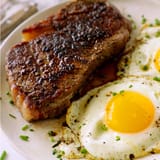Search Results
8/8/2025, 4:08:34 AM
Healthy Body, Healthy Mind
Fat loss isn’t just about “eating fewer calories”
When you slash calories too low, you may wonder why you’re not losing fat. When intake drops, so does your burn. This is called metabolic adaptation.
When insulin is elevated, your body stores energy. It cannot release stored fat efficiently. So, even in a calorie deficit, high insulin prevents fat loss. This is where most people go wrong.
How do you keep insulin high? These habits work against fat loss goals.. Snacking all day – High carb meals – Low fat diets – Drinking calories – Eating multiple times a day
You need insulin low enough for long enough to unlock fat. That means longer fasting periods, fewer meals, lower carb intake. More protein and healthy fats. That’s how you regain access to stored fat.
Think of it like this.. Your body is a hybrid car. When insulin is high, it runs on dietary fuel. When insulin is low, it switches to fat stores. But, if you never let insulin fall, you never switch fuels.
Here’s how fat loss actually works.. Eat 1 or 2 meals a day – Prioritize protein – Minimize processed carbs/sugar – Allow long fasting windows (14–16 hours, a few days a week) – Train for muscle, not just cardio.. This keeps insulin low and metabolism high.
Most people don’t eat enough protein to support fat loss and when you lose weight without protein, you don’t just lose fat. You lose muscle, which means your metabolism drops even further.
If you’re under-eating protein, your body can lose muscle, slow your metabolism, and store fat, even in a deficit.
Protein is your metabolism’s best friend. It does what calorie restriction can’t.. Reduces hunger – Boosts calorie burn (via thermic effect) – Preserves lean muscle mass
Fat loss isn’t just about “eating fewer calories”
When you slash calories too low, you may wonder why you’re not losing fat. When intake drops, so does your burn. This is called metabolic adaptation.
When insulin is elevated, your body stores energy. It cannot release stored fat efficiently. So, even in a calorie deficit, high insulin prevents fat loss. This is where most people go wrong.
How do you keep insulin high? These habits work against fat loss goals.. Snacking all day – High carb meals – Low fat diets – Drinking calories – Eating multiple times a day
You need insulin low enough for long enough to unlock fat. That means longer fasting periods, fewer meals, lower carb intake. More protein and healthy fats. That’s how you regain access to stored fat.
Think of it like this.. Your body is a hybrid car. When insulin is high, it runs on dietary fuel. When insulin is low, it switches to fat stores. But, if you never let insulin fall, you never switch fuels.
Here’s how fat loss actually works.. Eat 1 or 2 meals a day – Prioritize protein – Minimize processed carbs/sugar – Allow long fasting windows (14–16 hours, a few days a week) – Train for muscle, not just cardio.. This keeps insulin low and metabolism high.
Most people don’t eat enough protein to support fat loss and when you lose weight without protein, you don’t just lose fat. You lose muscle, which means your metabolism drops even further.
If you’re under-eating protein, your body can lose muscle, slow your metabolism, and store fat, even in a deficit.
Protein is your metabolism’s best friend. It does what calorie restriction can’t.. Reduces hunger – Boosts calorie burn (via thermic effect) – Preserves lean muscle mass
Page 1
